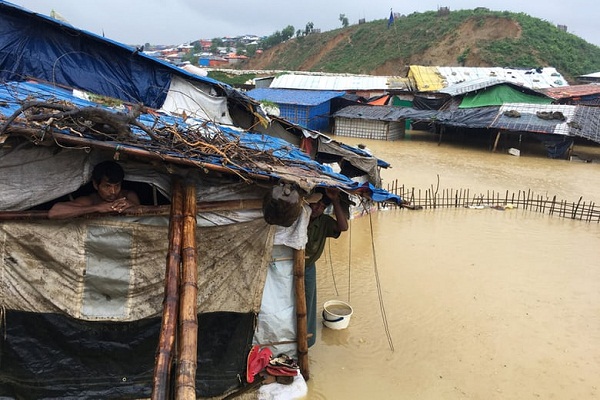Flame Fades for Rohingya Muslim Families amid Monsoons in Bangladesh

The acrid smoke hangs in the air as she works, as she sits to read the Quran at night and – especially – when she cooks.
The problem lies with the firewood she and the million other Rohingya refugees from Myanmar have to use for cooking. Like everything else, in their homes or on their bodies, the firewood has succumbed to the inescapable rainy season. With the wet weather comes uncertainty: where to find food, as well as the threat of floods, landslides and cyclones.
“We’ve struggled a lot during this monsoon,” says Khatun, 50, as her husband struggles to fasten fresh tarpaulin to the bamboo frame that forms their home.
“When it rains, the water leaks inside and makes the firewood wet. When we try to set a fire, nothing happens. So we throw kerosene on to the firewood and it becomes easier to light. Without kerosene or plastic or paper, it’s very hard to cook.”
Even her stove, hand-moulded from mud, has become wet in recent weeks after one side of the shelter was ripped out by heavy winds. Storms have destroyed their dwelling twice since the rains started in June, on each occasion causing damage that has necessitated weeks of repair work by her husband.
Makeshift shelters like Khatun’s have mushroomed near the Bangladesh-Myanmar border since last August, when a Myanmar military operation claimed an estimated 6,700 lives and prompted more than 700,000 people to flee across the border.
The majority clustered in the forests around Kutupalong, which has become one of the world’s largest refugee camps. Once an area of thick greenery, Kutupalong has become a sea of plastic tents propped up against each other and hanging from hillsides weakened by the rains.
Months of preparation were intended to limit the effects of the monsoon but much of that work has been undone; sandbags intended to shore up hills have themselves burst, and fortifications for family shelters have largely failed to prevent them flooding.
Providing food has been a challenge since the latest and largest wave of Rohingya refugees arrived in Bangladesh. Aside from having to hunt for fuel, many struggle with the lack of variety in their ration. But the increasing difficulty of simply cooking those basic supplies has added to their vulnerability.
Some, like Khatun’s family, try to set aside extra rice for their next meal whenever they are able to cook. They are often the families who use kerosene to ignite the fire, despite the dangerous smoke it produces. Others simply make do with weak flames that take hours to even partially cook rice.
The issues are worse for families whose homes have not only been damaged by winds but completely inundated by floodwater, rendering firewood useless and causing rice and lentil supplies to rot.
“There’s nothing I can do about it, unless I hang the bags from the roof,” says Sharmin Akhter, two days after returning to her shelter following flooding earlier in July.
“It was raining heavily and there were strong winds, like a mini-cyclone,” she recalls. “It rained much longer than usual, so the stream below flowed into the house. We were asleep – we didn’t realize until the water came inside.”
For more than two weeks, Akhter had to rely on relatives to provide her family with shelter and food until her home was repaired.
In several areas of the camps, Rohingya said they had often had to ask neighbors for food or request help from local camp leaders, known as Majhis, some of whom were coordinating families under their watch to ensure everyone was fed. Families without those options say they simply had to go without.
The World Food Programme (WFP) says that over the past week it has had to provide more than 1,560 people with prepared hot meals and 700 households with additional food aid, mostly in the form of high-energy biscuits.
Wet firewood also poses health risks for the refugees, says Peter Agnew, the emergency coordinator in Bangladesh for the UN’s Food and Agriculture Organization, especially since wholesale deforestation in the area means the wood they do collect is very young.
“It’s green and it still has leaves on it,” says Agnew. “You cook with that stuff in your house and it immediately fills packed full of smoke.
“Did you see any of the kids with the green stuff running out of their eyes? It’s really common, it’s eye infections. They hang out with their mother while they’re cooking and they get gunked-up infections in their eyes.”
Breathing problems have also increased. The World Health Organization’s weekly health reports showed a consistent rise in the number of patients for Acute Respiratory Infections to more than 10,000 per week during July.
The Rohingyas’ struggle to survive using firewood has not surprised the humanitarian community, which had already identified a need for sustainable fuel supplies in crisis situations.
A programme called Safe Access to Fuel and Energyhas been specifically developed to counter the use of wood for fuel, but the size and scale of the Rohingya crisis has proved challenging.
Source: The Guardian
 Most Commented
Most Commented 


